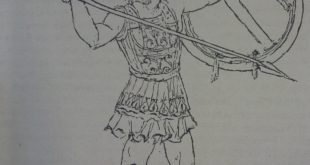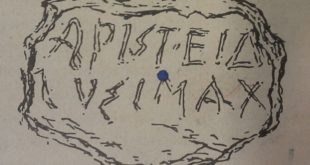The Austrian city of Vienna in 1814 would have dazzled even a Hollywood director. Emperors and empresses, kings and queens, dukes and duchesses — members of ruling families who hoped to recover thrones or to increase their lands — were there. So were leading statesmen from practically every country in Europe. For the so-called Congress of Vienna was meeting to make peace, now that Napoleon had finally been defeated. The Congress was going to set the world right again. The old city was overcrowded. Hotel rates soared and homeowners rented their houses at unheard of prices. Laundresses grew wealthy and …
Read More »The French Revolution and Napoleon
The year is 1789; the place, Versailles, France. Several hundred delegates representing the people of France sit sullenly in the palace hall. When an officer of the King orders them to leave the hall and return to their proper meeting place, one delegate rises to his full height and thunders, “Tell your master that we are here by the will of the people, and that only bayonets can drive us forth” A meeting of representatives of the French people? Defiance to the commands of the powerful king of France? In view of what you have read earlier about royal authority …
Read More »The Peoples of America Win Control over their Own Affairs
Even though you are familiar with the story of the American Revolution, perhaps you do not realize that only nine short days at Christmas time in 1776 changed the course of the English colonies’ fight for freedom. Within that short space of time, General Washington’s ragged, dwindling army captured the hired German troops at Trenton, New Jersey and routed a British force at nearby Princeton. To win such surprising victories and to keep the American Revolution from collapsing took the devoted leadership and military skill of General George Washington. It took patriot soldiers whose term of service had run out …
Read More »Basic Ideas of Freedom take Root in Early Modern Times
Freedom! Liberty! Here are words which most Americans have heard all their lives. Freedom is the subject of the Declaration of Independence and of the Bill of Rights in our Constitution. Our patriotic songs refer to America as “sweet land of liberty” and “the land of the free and the home of the brave.” Just what do we mean by freedom or liberty? We mean several things, for there is more than one kind of freedom. First, there is personal freedom — the right of the individual to go where he wants, to choose his occupation, to say and write …
Read More »Marathon
Both Sparta and Athens were determined to fight, — so determined that they had behaved outrageously towards Persian ambassadors who had visited them to demand submission. The traditional way of doing this was to ask for “earth and water” but when the ambassadors made this demand in Athens they were thrown into the pit where criminals were put. “Get earth from there”, yelled the citizens. At Sparta the ambassadors were plunged into a well. “Get water from there”, they were told. Throughout history the person of an ambassador has been held sacred and if the Persians had won at Marathon …
Read More »The Ionian Greeks
The Ionian Greeks, who lived on the coast of Asia Minor and the adjoining islands, had produced some of the leading poets and thinkers of the Greek world. Thales of Miletus (640-546 B.C.) predicted an eclipse of the sun and introduced geometry to the Greeks. Pythagoras of Samos (c. 500) won fame as a philosopher and mathematician, although it is not now thought that he discovered the geometrical truth which bears his name (i.e. that the square on the hypotenuse of a right-angled triangle is equal to the sum of the squares on the other two sides). Thales was interested …
Read More »Athenian Democracy
The heroism of Harmodius and Aristogeiton was a myth, but Athenian democracy was not. In the two great wars of the fifth century — the Persian and the Peloponnesian — the Athenians clearly felt they had what would now be called a “way of life” which was worth fighting for. Cleisthenes, although he was of nobler blood than Solon, gave more power to the poor than Solon had done. Nearly all Athenian citizens now had a vote in the Assembly, a body which approved laws discussed in the Council of Five Hundred. The Five Hundred were elected by the citizens …
Read More »A Tyrant Who Was Not Tyrannical
A tyrant’s first problem was to seize power. Peisistratus had to solve this problem three times. In 560 he came before a meeting of the Assembly wounded and bleeding, alleging that his political opponents had attacked him. Sympathisers voted him a body-guard, with the aid of which he was able to seize power, but his opponents soon forced him to take flight. His next descent on the city was made in a chariot, in which he was accompanied by a handsome woman dressed up as Athena. He alleged that his companion was in fact Athena and that she had chosen …
Read More »The Growth and Expansion of Russia
Andrei was carving a wooden sleigh. So expert was he in the use of a knife that he could make a toy sleigh, driver and all, in two long winter evenings. Another night would be enough for the horse, which wasn’t difficult, but Andrei always had a hard time with the yoke that went over the neck. The yoke was shaped like a big wishbone and Andrei could never understand why Russian horses wore such high and heavy yokes. “Just like us peasants!” thought Andrei, “We too carry heavy burdens and are little more than slaves.” Andrei thought many things …
Read More »France and England Clash Over Power
If you are fortunate enough to visit eastern Canada, undoubtedly you will wish to include the city of Quebec in your travels. Quebec is perched on the sides and the summit of a steep, rocky promontory overlooking the St. Lawrence River. With narrow, winding streets and French speaking population, the city is a reminder of past centuries when France controlled much of what is now Canada. On September 13, 1759, on the plain outside Quebec, was fought one of history’s decisive battles. For several years English and French forces had been battling in North America, but neither side had been …
Read More »








